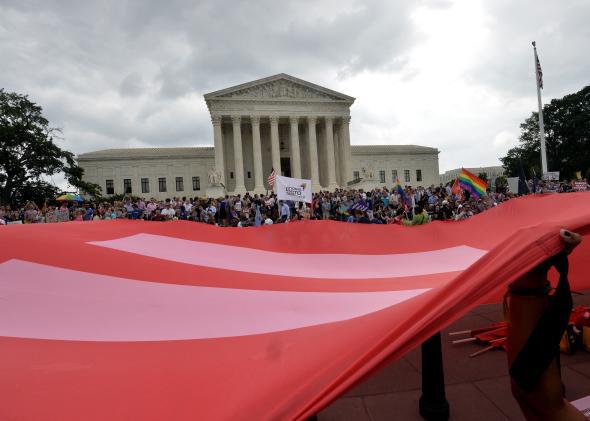Justice Anthony Kennedy’s majority opinion echoes the opinion in Loving v. Virginia (1967), in that it recognizes both the liberty and the equality claims made by the plaintiffs. In Loving, the court recognized that the 14th Amendment’s Equal Protection Clause and the Due Process Clause both required the states to recognize marriages between interracial couples. Unlike Loving, however, which largely treats the equality and liberty claims as parallel and independent claims, Obergefell treats them as intertwined. In a self-conscious reinforcement of Lawrence v. Texas (which struck down sodomy statutes in 2003), Obergefell recognizes the connection between liberty and equality (“In Lawrence the Court acknowledged the interlocking nature of these constitutional safeguards in the legal treatment of gays and lesbians. … This dynamic also applies to same-sex marriage”). Only future cases will show the full measure of what the recognition of this intersection, which Laurence Tribe and others (including me) have noted, will portend.
One thing that seems almost certain, however, is that this understanding puts paid to the idea that Due Process liberty analysis is backward-looking while Equal Protection analysis is forward-looking. Since at least Washington v. Glucksberg (1997), progressive constitutionalists have expressed concern that the recognition of new liberties under the 14th Amendment would be greatly conscribed. That opinion underscored that liberties had to be “deeply rooted in the nation’s history and traditions and implicit in the concept of ordered liberty.” After Glucksberg, it seemed that liberty analysis would have to be backward-looking, protecting established rights against majority encroachment. It would be left to equality analysis, which seeks to undo historical state practices, to push us forward into the future.
To be clear, I disagree with the understanding offered by the Glucksberg decision, not only normatively but also descriptively—many Due Process cases prior to Glucksberg had actually been “forward-looking” in granting rights without strong historical support (such as Griswold, the right of married couples to use contraception, Eisenstadt, the right of individuals to use contraception, and Roe). But Glucksberg appeared to chain the recognition of Due Process liberties to historical practices. Lawrence, which postdated Glucksberg, took on this cramped understanding of liberty, striking the chains of history from Due Process analysis. However, it did not mount a wholesale attack on Glucksberg’s formulation.
Obergefell, in contrast, does. Kennedy’s opinion notes that “Glucksberg did insist that liberty under the Due Process Clause must be defined in a most circumscribed manner, with central reference to specific historical practices.” However, the opinion continues, “while that approach may have been appropriated for the asserted right there involved (physician-assisted suicide), it is inconsistent with the approach this Court has used in discussing other fundamental rights, including marriage and intimacy.” Lest anyone remain uncertain how far the court sought to move away from the Glucksberg approach, the court had this clarification: “If rights were defined by who exercised them in the past, then received practices could serve as their own continued justification and new groups could not invoke rights once denied.” Such broad language suggests that the Glucksberg formulation may ultimately be rejected as a “bare remnant of abandoned doctrine.”
On Friday, progressives will be righty focused on the result in this case for same-sex marriage and celebrate the fact that same-sex marriages will no longer fade in and out like radio signals depending on the state across which one is traveling. But when the dust settles, the great jurisprudential advance of this opinion will become more evident. By linking liberty to equality, Kennedy’s opinion recognizes and reinforces the idea that both can be vehicles for constitutional progress. For those who have despaired about the recognition of “new” constitutional rights, such as the right to education or health care, that may be the lasting impact of this opinion.
Read the previous entry, by Dahlia Lithwick. Read the next entry, by Mark Joseph Stern.
Read more of Slate’s coverage of same-sex marriage at the Supreme Court.
